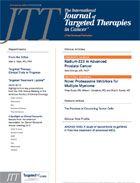Genomic Alterations Characterized in HNSCC
Head and neck squamous cell carcinomas have different patterns of genetic alterations, some of which may be druggable, according to a study by The Cancer Genome Atlas.
D. Neil Hayes, MD, MPH
Head and neck squamous cell carcinomas (HNSCCs) have different patterns of genetic alterations, some of which may be actionable or druggable, according to a study by The Cancer Genome Atlas (TCGA) that was presented at the AACR 2013 annual meeting.
The study should be useful as a landmark research tool for HNSCC, according to D. Neil Hayes, MD, MPH, University of North Carolina Lineberger Comprehensive Cancer Center in Chapel Hill.
Hayes and colleagues conducted the comprehensive genomic analysis on tumor tissue and healthy tissue obtained from 279 patients with previously untreated HNSCC. Tobacco use and HPV infection are major risk factors for HNSCC; 80% of these patients had a history of smoking, and 13% had HPV-positive tumors.
Smoking-related cancers typically are diagnosed when patients are node-positive, and 5-year survival is about 50%. People with HPV-positive HNSCC have a better prognosis, with 5-year survival rates of up to 90%. However, standard treatment for HPV-positive HNSCC is highly toxic, and there is an incentive to identify targeted therapy with fewer side effects.
The researchers identified more than 30 sites of significant alterations in genes or genetic regions in patients with HNSCC, and 15 significantly mutated genes that includedCDKN2A,TP53,PIK3CA,NOTCH1,HRAS, andNFE2L2. Most of the genetic aberrations overlapped with findings in lung squamous cell carcinoma.
“This is not surprising. Both of these cancers are related to tobacco. The shared genetic alterations between HNSCC and lung squamous cell cancer suggest that these properties go beyond the type of cancer, and squamous cell cancers could be studied at a model systems level,” Hayes said.
Key observations of the TCGA study were related to HPV status. Patients with HPV-positive HNSCC have infrequentEGFRgene amplification and also have a high rate ofPIK3CAgene mutations, but these patients almost never haveTP53alterations.PIK3CAmutations were activated in about 21% of HPV-positive tumors, which was the highest frequency of a druggable mutation in this study. PIK3CA inhibitors are being developed for breast cancer and may have a role in treating HNSCC with these mutations, Hayes said.
Other investigators have previously shown that HNSCC tumors organize themselves into four groups based on genetic alterations, and this report confirms the observation. The subtypes are:
- Atypical--with no amplification ofEGFR, HPV-positive, and a high rate of PI3 kinase (PIK3CA)
- Classical--also seen in lung squamous cell cancer, and associated with two key mutations,KEAP1andNFE2L2
- Mesenchymal--mostly mutations ofFGFR1andFGFR2
- Basal--highly associated withSOX2amplifications and overexpression
In general, HPV-positive patients have a better outcome than HPV-negative patients. However, Hayes and his colleagues identified several druggable mutations in HPV-negative patients that includeEGFR,FGFR, andCCND1.
“There is a wealth of data, and now we will struggle with making sense of it. Our observations are an advance but make things more complex. We are able to recognize patterns in genetic alterations, and some of these patterns may turn out to be druggable, or actionable in the future,” Hayes said.
Hayes said that the findings about infrequentEGFRamplification in HPV-positive patients raise questions about the effectiveness of EGFR inhibitors approved by the FDA in this setting. “The findings also suggest that PIK3CA inhibitors in development may be of benefit for these patients. However, any treatment conclusions should be based on treatment data, and the TCGA study did not include treatment data,” he noted.

Survivorship Care Promotes Evidence-Based Approaches for Quality of Life and Beyond
March 21st 2025Frank J. Penedo, PhD, explains the challenges of survivorship care for patients with cancer and how he implements programs to support patients’ emotional, physical, and practical needs.
Read More